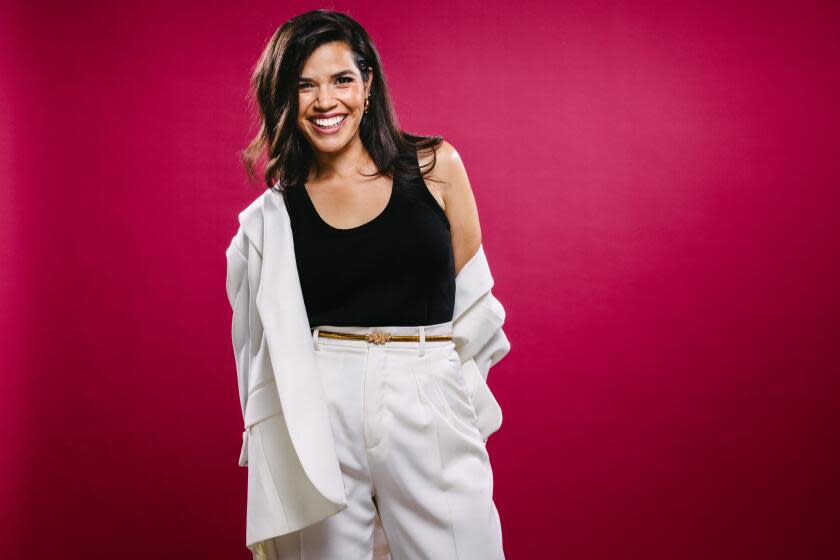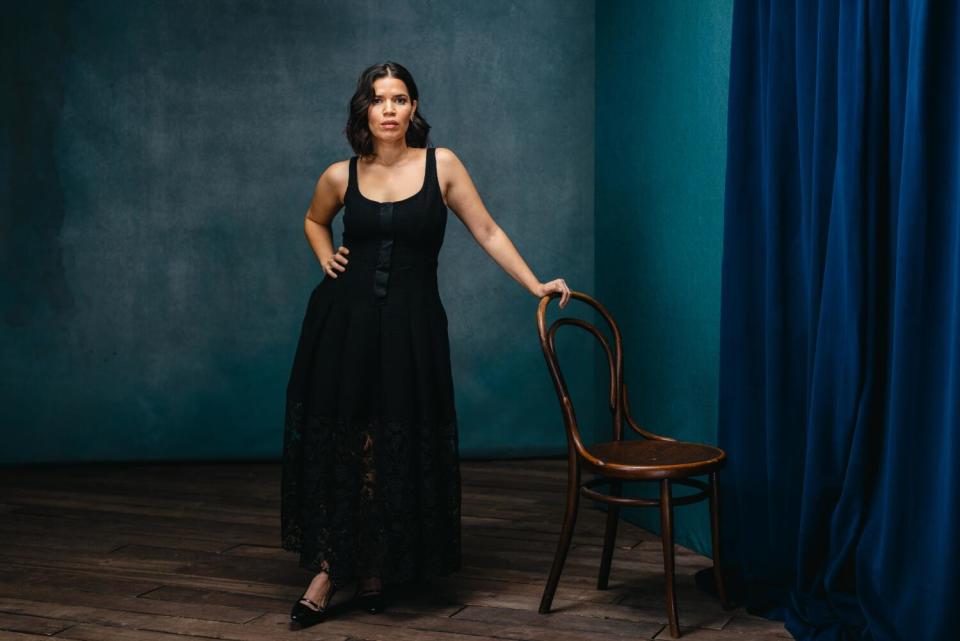How America Ferrera listens to a different kind of monologue these days

Perhaps the only person not shocked by America Ferrera's first Oscar nomination is the actor herself, thanks to an innate belief in what is for her in this world.
“When I read 'Real Women Have Curves,' there wasn’t a doubt in my mind that this was my story to tell as that character,” she declares of her 2002 breakthrough role as high school graduate Ana, whose big dreams do not gel with the traditionally familial Latina path. “When I auditioned for 'Ugly Betty,' I knew that she was mine. I knew that Carmen in 'The Sisterhood of the Traveling Pants' was mine. I knew Gloria [in 'Barbie'] was me. I had a full-body ‘yes.’ ”
Such unbridled conviction is nothing new for this Honduran American USC grad, the youngest of six born in Los Angeles. By 2007, a year after she’d begun starring in “Ugly Betty,” Ferrera was named one of Time magazine’s 100 Most Influential People in the World. And if her “Barbie” speech nailed that Oscar nod, another truly announced her arrival in “Ugly Betty's" pilot episode. Arriving for a fashion magazine job interview, Betty’s bushy brows, braces and less-than-runway-ready style did not augur well. Then she delivered a monologue asserting what made her right for the job — and Hollywood has listened ever since.
Read more: 'It was tough for me to play that part': How six actresses tackle their fears
No one who knew Ferrera as a child is surprised. “Five-year-old America was ready to go,” she recalls of declaring then, “I’m going to be an actress and a human rights lawyer. She saw it for herself and she went,” Ferrera smiles, bare-faced and glowingly beautiful, from her office at home in New York City. “Of course I’m not a human rights lawyer but I guess, early on, acknowledged in me that I was a justice-seeker, a fighter inside.”
These days, roles — in both the entertainment industry and advocacy — demand that “unequivocable yes. I feel like I’ve learned to just trust that and get to put my energy and time into the things that I uniquely can do and that I uniquely love to do and that brings me joy. And kind of what a relief to be like, ‘Oh, I don’t have to be everything, I get to just be the thing that lights me up inside' and lucky for me, that’s more than one thing. But it becomes easier and easier to trust my inner barometer of what is worth my time and energy, and what isn’t.”
She realized her current monologue might assume a life of its own at the Los Angeles “Barbie” premiere, when it elicited “a very vocal response and cheers” halfway through. “I was sitting with my 3½-year-old daughter on my lap and my 5-year-old son sitting on my husband’s [Ryan Piers Williams] lap next to me and, I think, trying to see it through their eyes, trying to see what they saw, and getting to feel a little bit more of what the audience was feeling. But it was kind of hard to watch myself and to let it in.”
It hit more intently when nine Latina actresses performed and shared the speech on social media and when Ariana Greenblatt (her screen daughter) unleashed another surprise. “We spent two days and so many takes filming the monologue, and when we had finished, Ariana started saying the words back to me. I just started crying because she had memorized the whole monologue. I was like, ‘You did not,’ and she said, ‘I did.’ Hearing it come out of a 14-year-old girl’s mouth, with understanding and appreciation for what the words meant, really struck me.”
Of criticisms that outrage over Greta Gerwig and Margot Robbie’s not being Oscar-nominated as director and lead actress, respectively, epitomizes white feminism, she notes, “It’s always really painful to watch things be reduced down to a singular thing. We live in a complex world, and lots of things can be true at the same time. We can be disappointed that women who deserve recognition are not getting recognition, while celebrating the women who are making history and breaking boundaries.”
There’s an odd amalgam of symmetry and irony in Ferrera’s first Oscar nomination’s being for a film so predicated on a doll that often defined beauty standards. “From the time I started in my career as a 17-year-old child, there was so much focus on my appearance and that wasn’t because I set out to say anything about beauty. I just was who I was and I guess who I was was a challenge to those norms." She’s correct in observing that this was all about the then-culture and what it saw in her. Ferrera knew her job was “to bring dimensions and layers” to her characters while muting the persistent commentary that “this is different."
"My hope in this day and age is that a young woman, a very average-sized woman like myself, would be able to play characters that go beyond her appearance. I was so lucky that I did get the opportunity to play those rich characters but the way in was a focus on my appearance.”

She relishes the full circle aspect of her upcoming feature directorial debut, “I Am Not Your Perfect Mexican Daughter,” based on the bestselling novel by Erika L. Sánchez, which shares several parallels with “Real Women Have Curves.” Both feature Latina teenagers dreaming of college rather than work/marriage/babies in their immediate futures. The project is in script development with no cast, but “no way” will Ferrera star this time.
The wall behind her is dotted with rows of index cards featuring excerpts from the book. And when I ask where her own personal Gloria Barbie is, she points up at a shelf that also holds her “little felt thing” of her character Amy from the NBC sitcom “Superstore” and her “Ugly Betty doll.” I can’t see whether it also holds her awards (including an Emmy, Golden Globe and SAG Award for “Ugly Betty,” with 26 wins in total to date).
Ferrera first directed while starring on “Superstore” and immediately felt having “to fire on so many cylinders at the same time” was a good fit. “You get to be in collaboration with people who are the best at what they do, so your good ideas get made better. I do think I’m good at it but, more than being good at it, I feel so activated on every level.”
Read more: How Margot Robbie overcame a 'palpable and debilitating' panic to make 'Barbie'
She also lends her time to nonprofits she co-founded, Poderistas and Harness, and is an investor in Los Angeles women’s soccer team Angel City, sporting their black sweatshirt on this day. Having once revealed she was advised to “allocate the resource of you,” Ferrera allocates herself broadly, because she doesn’t know how not to. “There were times in my life when I tried, for simplicity, to just be one thing. And it always felt so wrong. I just knew that I was a person who cared about, and had passions for, so many different things. Some of the things that I love about performance and storytelling are very linked to what I love about being an advocate, because telling stories has the power to change the way people think about themselves and other people.”
For now, though, she's listening to her own inner monologue, which has morphed into: “How do I be more of who I am and what I am and let the culture catch up?”
She's also simply enjoying her “incredible ride,” playing fangirl around her fellow nominees and feeling “like part of a team sport.” She’s come full circle with the Oscars too. “I very viscerally remember watching Halle Berry win and how that felt like a breakthrough for so many of us. I feel so honored to be able to be representative for anyone watching who might see themself in me and then imagine that that’s possible for them too. I needed that growing up.”
This story originally appeared in Los Angeles Times.


